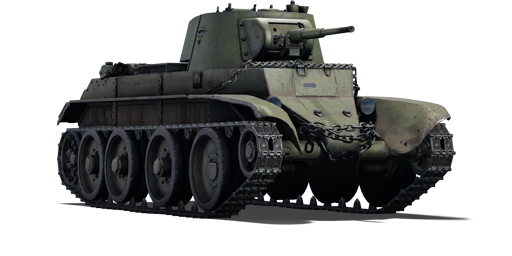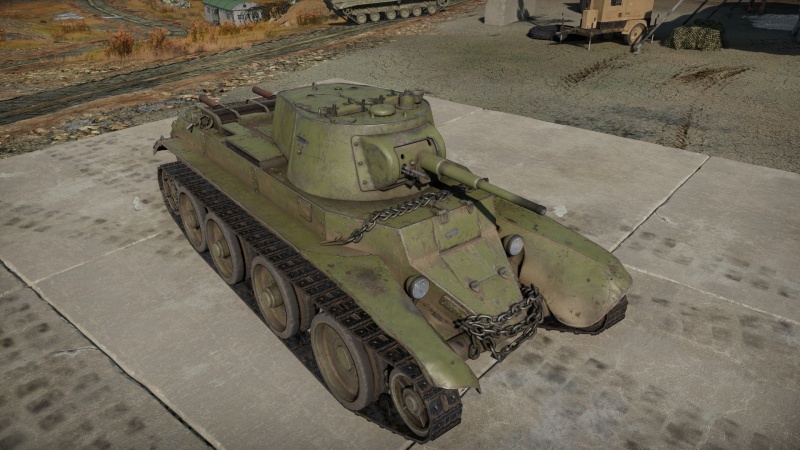BT-7M
| This page is about the Soviet light tank BT-7M. For other versions, see BT-7 (Family). |
Contents
Description
The BT-7M is a rank I Soviet light tank with a battle rating of 2.0 (AB/RB/SB). It was introduced in Update "Ixwa Strike".
General info
Survivability and armour
Armour type:
- Rolled homogeneous armour (hull, turret)
| Armour | Front (Slope angle) | Sides | Rear | Roof |
|---|---|---|---|---|
| Hull | 20 mm (18°) Upper plate 15 mm (61°) Middle plate 20 mm Lower plate |
20 mm Forward 15 mm + 4 mm Rearward |
10-13 mm | 10 mm Roof 4 mm Radiator grilles |
| Turret | 15 mm Turret front 15 mm Gun mantlet |
15 mm Forward 13 mm Rearward |
13 mm | 10 mm |
Notes:
- Suspension wheels, tracks and torsion bars are 15 mm thick.
- Belly armour is 6 mm thick.
Mobility
| Game Mode | Max Speed (km/h) | Weight (tons) | Engine power (horsepower) | Power-to-weight ratio (hp/ton) | |||
|---|---|---|---|---|---|---|---|
| Forward | Reverse | Stock | Upgraded | Stock | Upgraded | ||
| Arcade | 69 | 12 | 14.7 | 775 | 954 | 52.72 | 64.9 |
| Realistic | 63 | 11 | 442 | 500 | 30.07 | 34.01 | |
Modifications and economy
Armaments
Main armament
| 45 mm 20-K | Turret rotation speed (°/s) | Reloading rate (seconds) | |||||||||||
|---|---|---|---|---|---|---|---|---|---|---|---|---|---|
| Mode | Capacity | Vertical | Horizontal | Stabilizer | Stock | Upgraded | Full | Expert | Aced | Stock | Full | Expert | Aced |
| Arcade | 188 | -5°/+20° | ±180° | N/A | 15.2 | 21.1 | 25.6 | 28.3 | 30.1 | 3.77 | 3.33 | 3.07 | 2.90 |
| Realistic | 9.5 | 11.2 | 13.6 | 15.0 | 16.0 | ||||||||
Ammunition
| Penetration statistics | |||||||
|---|---|---|---|---|---|---|---|
| Ammunition | Type of warhead |
Penetration @ 0° Angle of Attack (mm) | |||||
| 10 m | 100 m | 500 m | 1,000 m | 1,500 m | 2,000 m | ||
| BR-240 | APHEBC | 70 | 68 | 59 | 50 | 42 | 35 |
| BR-240SP | AP | 73 | 71 | 62 | 52 | 44 | 37 |
| Shell details | |||||||||
|---|---|---|---|---|---|---|---|---|---|
| Ammunition | Type of warhead |
Velocity (m/s) |
Projectile Mass (kg) |
Fuse delay (m) |
Fuse sensitivity (mm) |
Explosive Mass (TNT equivalent) (g) |
Ricochet | ||
| 0% | 50% | 100% | |||||||
| BR-240 | APHEBC | 760 | 1.43 | 1.2 | 9 | 29.26 | 48° | 63° | 71° |
| BR-240SP | AP | 757 | 1.43 | N/A | N/A | N/A | 47° | 60° | 65° |
Ammo racks
| Full ammo |
1st rack empty |
2nd rack empty |
3rd rack empty |
4th rack empty |
5th rack empty |
6th rack empty |
Visual discrepancy |
|---|---|---|---|---|---|---|---|
| 188 | __ (+__) | __ (+__) | __ (+__) | __ (+__) | __ (+__) | __ (+__) | __ |
Machine guns
| 7.62 mm DT | ||||
|---|---|---|---|---|
| Mount | Capacity (Belt) | Fire rate | Vertical | Horizontal |
| Coaxial | 1,890 (63) | 600 | N/A | N/A |
Usage in battles
Describe the tactics of playing in the vehicle, the features of using vehicles in the team and advice on tactics. Refrain from creating a "guide" - do not impose a single point of view but instead give the reader food for thought. Describe the most dangerous enemies and give recommendations on fighting them. If necessary, note the specifics of the game in different modes (AB, RB, SB).
Pros and cons
Summarise and briefly evaluate the vehicle in terms of its characteristics and combat effectiveness. Mark its pros and cons in a bulleted list. Try not to use more than 6 points for each of the characteristics. Avoid using categorical definitions such as "bad", "good" and the like - use substitutions with softer forms such as "inadequate" and "effective".
Pros:
- More powerful engine, meaning it is much faster than the previous BT-7
- Fast firing gun
Cons:
- Sits at a higher BR than the previous BT-7
- Armour remains paper thin, with heavy machine guns and autocannons from SPAA being able to shred it
History
The BT-7M was an improved version of the Soviet BT-7 light tank developed before the Second World War. The main improvement was in terms of the powerplant, and at the time it was built no other tank in the world could reach the same speeds.[1]
Development
Development of a version of the BT-7 light tank began in the Soviet Union in 1938 with the construction of four prototypes at the Kharkov Locomotive Plant called the BT-8, which used a V12 diesel engine which was developed from the Hispano-Suiza 12Y aircraft engine. After the BT-8 was tested against the BT-7 it was determined to continue its development which resulted in the production version, designated BT-7M.[1][2]
Design
The BT-7M had the 500 horsepower V12 engine which was actually chosen partly due to greater fuel efficiency. The hull was reinforced with braces and some of the fuel storage was removed due to the higher fuel efficiency of the engine. The BT-7M’s engine also proved to be much safer in that it caught on fire much less often when hit by enemy fire. The BT-7M was proven to have a top speed of 62 km/h on tracks and 86 km/h with just wheels. Other than these changes, the BT-7M was fairly similar to the regular BT-7.[1][2]
Production and Service
The BT-7M entered production in 1939, replacing all earlier BT-7 variants on production lines. It was the last BT-7 variant produced with production lasting until 1941. Approximately 788 BT-7M tanks were built during that time period, being superseded on production lines by the T-34 medium tank. The BT-7M did end up seeing some combat during the Great Patriotic War.[1][2]
Media
- Skins
- Videos
See also
Links to the articles on the War Thunder Wiki that you think will be useful for the reader, for example:
- reference to the series of the vehicles;
- links to approximate analogues of other nations and research trees.
External links
Paste links to sources and external resources, such as:
- topic on the official game forum;
- other literature.
References
| USSR light tanks | |
|---|---|
| T-26 | T-26 · T-26 (1st Gv.T.Br.) · T-26-4 · T-26E |
| BT | BT-5 · RBT-5 · BT-7 · BT-7 TD · BT-7M · BT-7A (F-32) |
| T-50 | T-126 · T-50 |
| T-70 | T-70 · T-80 |
| PT-76 | PT-76B · PT-76-57 · Object 906 |
| BMP | BMP-1 · BMP-2 · BMP-2M · BMP-3 |
| BMD | BMD-4 |
| 2S25 | 2S25 · 2S25M |
| Wheeled | BA-11 · BTR-80A |
| Other | T-60 · Object 685 · 2S38 |
| China | ▂Type 62 |





